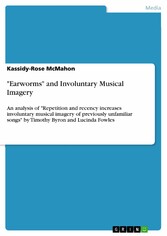Search and Find
Service
'Earworms' and Involuntary Musical Imagery - An analysis of 'Repetition and recency increases involuntary musical imagery of previously unfamiliar songs' by Timothy Byron and Lucinda Fowles
More of the content

'Earworms' and Involuntary Musical Imagery - An analysis of 'Repetition and recency increases involuntary musical imagery of previously unfamiliar songs' by Timothy Byron and Lucinda Fowles
Document from the year 2017 in the subject Musicology - Miscellaneous, Griffith University (Queensland Conservatorium of Music), course: Bachelor of Music, language: English, abstract: This research essay analyses a published research paper by Timothy Byron and Lucinda Fowles titled 'Repetition and recency increases involuntary musical imagery of previously unfamiliar songs'. In addition to this, an explanation of the experimental design of a primary experiment conducted by the 1105QCM class will be provided. The results and their importance will be discussed in detail with reference to the article by Byron and Fowles. Finally, the strengths and limitations of the experiment will be examined to draw conclusions about the accuracy and reliability of the data. The research aimed to determine the relationship between familiarity, likeability, number of earworms experienced and earworm length. It was found that familiarity had no impact on the number of earworms or earworm length for a particular song, which rejected the initial hypothesis. It was discovered that the likeability of a particular song increased the number of times it occurred as an earworm and increased earworm length, which supported the hypothesis. An earworm (involuntary musical imagery, or INMI) may be described as the experience of a short tune, which becomes trapped in the mind and is heard repeatedly outside one's conscious control. A study by Liikkanen showed 91.7% of the 12, 420 participants reported INMI at least once a week; 33.2% every day and; 26.1% several times a day (2008).
Platinum Griffith Graduate of Influence Award recipient Kassidy-Rose McMahon (B.Mus.) is a Brisbane-based music teacher with an inextinguishable passion for education.
All prices incl. VAT











